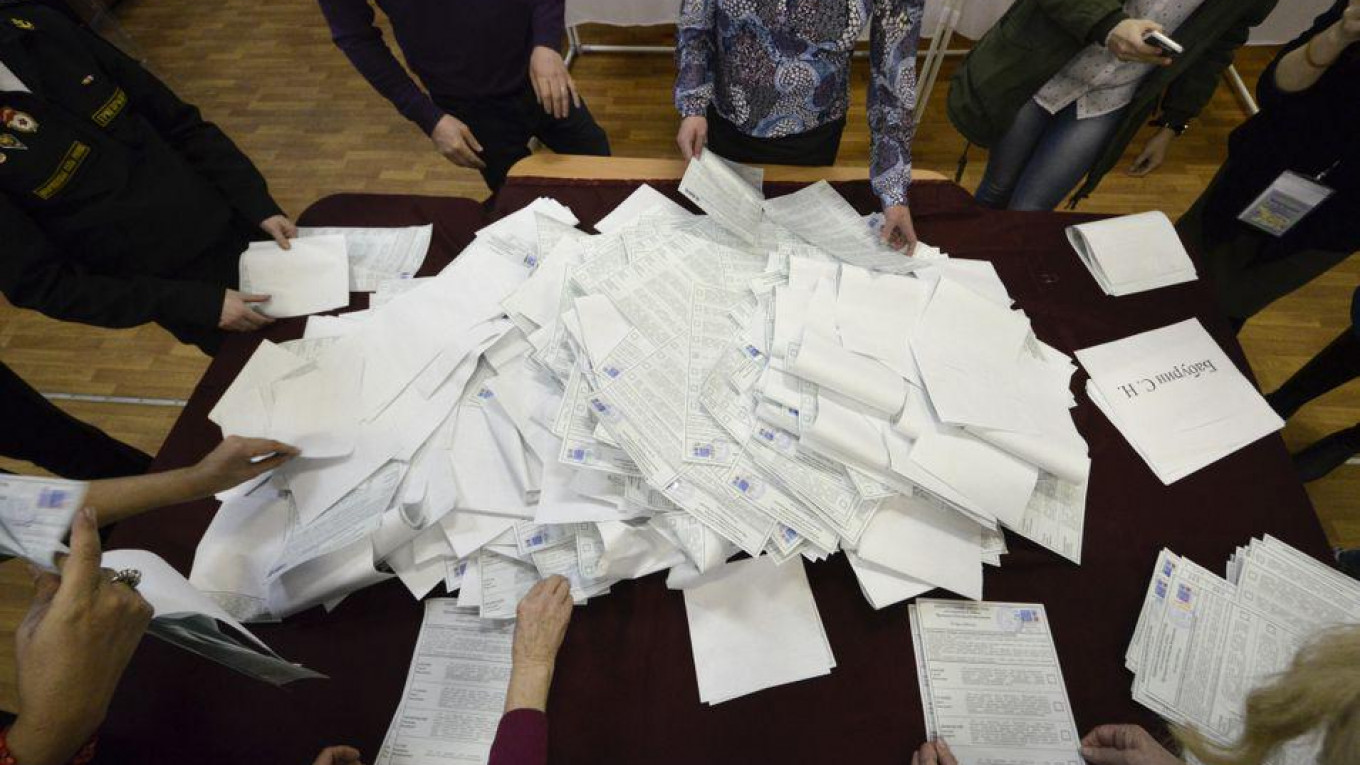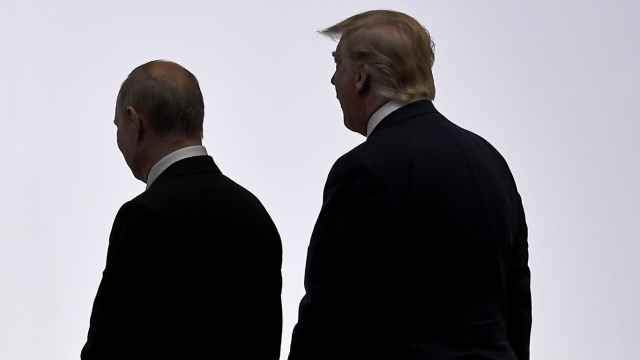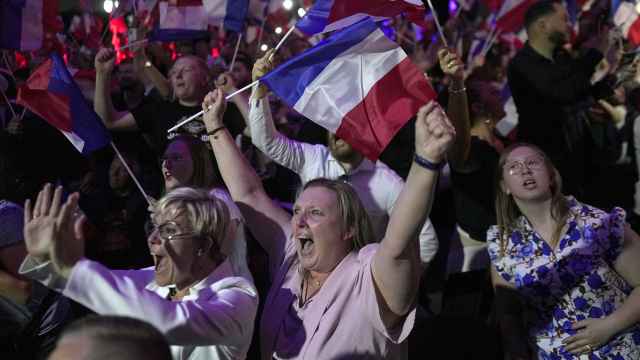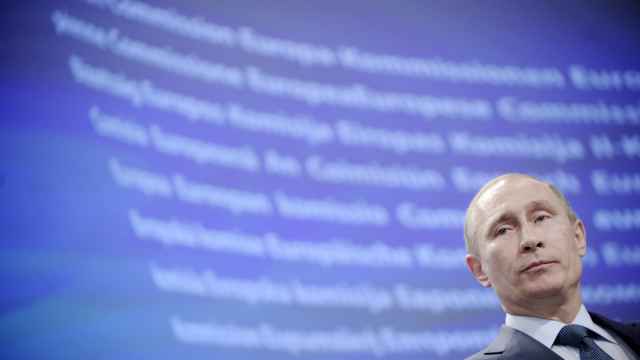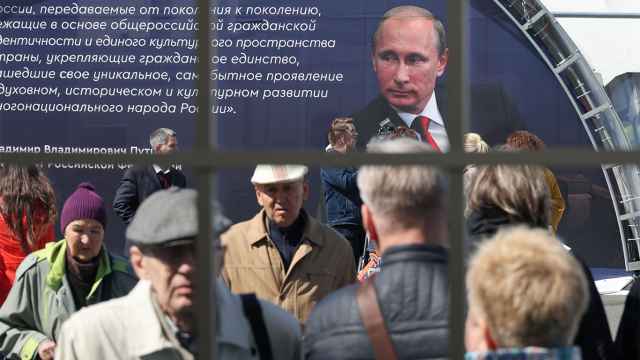Opponents of Russian President Vladimir Putin alleged that voters in Sunday's presidential election were being compelled to show up at polling stations in a Kremlin drive to ensure Putin's likely win is not tarnished by a low turnout.
Ivan Zhdanov, an aide to opposition leader Alexei Navalny, who is barred from running in the race, said Navalny supporters monitoring the vote reported people being bussed to polling stations by their employers.
"We would call this the 'shuttle bus election'," Zhdanov told a briefing. "Some organisations, some buses, are bringing massive amounts of people."
Kremlin officials privately acknowledge some voters are reluctant to show up and vote, even if they support Putin, because they believe his victory is already a foregone conclusion. The officials say though the vote will be fair.
Ella Pamfilova, head of the commission organising the vote nationwide, has said any fraud will be stamped out. She said those alleging the election was rigged were biased against Russia.
Reuters reporters at polling stations across Russia spoke to multiple voters who said they had been instructed by bosses or academic supervisors to vote. Many took photographs of themselves voting, saying they were needed as proof.
In one case, a senior election official inspecting a polling station said the photographs of voting should not be allowed, and ordered election staff there to stamp it out.
Here are some of the cases compiled by Reuters reporters from speaking to people in polling stations:
― Natalia Lobzhanidze is the director of School no. 3 in Ust-Djeguta, in the Karachayevo-Cherkessia region of southern Russia, which is hosting polling station number 215. "One girl came from (regional capital) Cherkessk, we took her photograph, because her bosses asked her to report back. She's registered here, so she had to come here."
― A 25-year-old man at polling station number 02-13 in the settlement of Gryazi, in the Lipetsk region south of Moscow, said: "At work we were forced to come and vote, with photos and all the rest of it."
― At polling station number 217 in Ust-Djeguta, two 18-year-old students case their ballots. Asked by a Reuters reporter why they voted, one said: "To be honest, we were forced to." When asked who forced them, the student said: "The teacher."
― At the same polling station in Ust-Djeguta, a group of women voted, then climbed aboard a bus that was waiting for them in the street. The bus had the name of a local children's' care home written on the side. Asked by a Reuters reporter if an organisation had sent them to vote, the women declined to comment.
― At a polling station in Simferopol, in the Crimea region which Russia annexed from Ukraine, a couple with a child photographed themselves putting a voting slip into a ballot box. Explaining why they wanted the photograph, the woman said: "I work in a kindergarten, I need it for work."
― In polling station 1515 in Zelenodolsk, 800 km (500 miles) east of Moscow, five people photographed themselves voting. Asked by a Reuters reporter why, one of the group, a young woman, said: "What do you mean why? It's a photographic report for our bosses."
― At polling station number 216 in Ust-Djeguta, Marina Kostina was supervising two teenage girls who were taking pictures of voters with ballot papers. Asked why one woman was photographed, Kostina said: "Her work asked her to report in."
― Also at polling station 216 in Ust-Djeguta, a woman around 40 said she was asked to provide proof of herself voting by her boss in the town's kindergarten number 6.
A Message from The Moscow Times:
Dear readers,
We are facing unprecedented challenges. Russia's Prosecutor General's Office has designated The Moscow Times as an "undesirable" organization, criminalizing our work and putting our staff at risk of prosecution. This follows our earlier unjust labeling as a "foreign agent."
These actions are direct attempts to silence independent journalism in Russia. The authorities claim our work "discredits the decisions of the Russian leadership." We see things differently: we strive to provide accurate, unbiased reporting on Russia.
We, the journalists of The Moscow Times, refuse to be silenced. But to continue our work, we need your help.
Your support, no matter how small, makes a world of difference. If you can, please support us monthly starting from just $2. It's quick to set up, and every contribution makes a significant impact.
By supporting The Moscow Times, you're defending open, independent journalism in the face of repression. Thank you for standing with us.
Remind me later.


